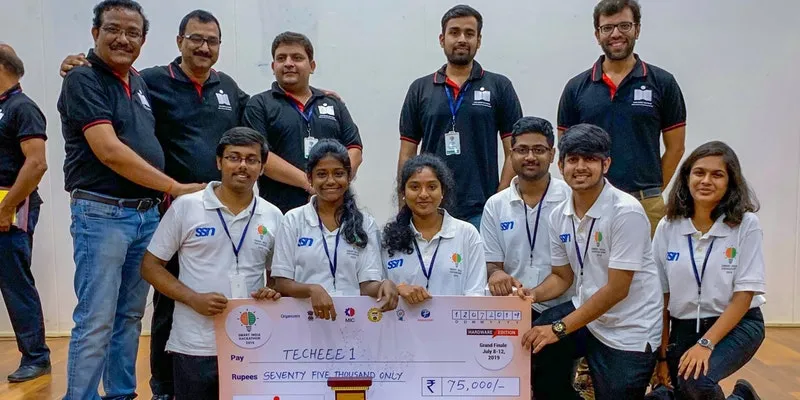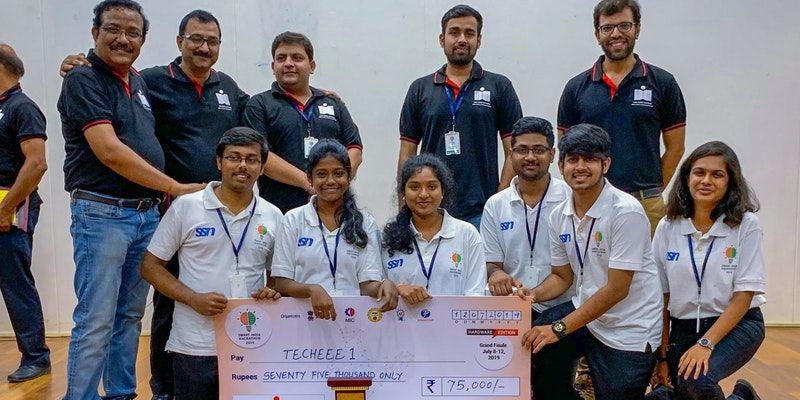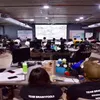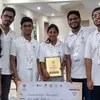Chennai students win award for developing a device to extract water from thin air
Fourth-year engineering students win a cash prize of Rs 75,000 at the Hardware edition of the Smart India Hackathon (SIH) 2019, giving hopes to millions of Indians suffering in drought-hit areas.
More than 43.4 percent of India is reeling under drought, according to a recent report by Drought Early Warning System. Another report released by Niti Aayog states that India is facing its worst water crisis in history, and that demand for potable water will outstrip supply by 2030 if immediate steps are not taken.
This doesn’t end here. The report also says that nearly 600 million Indians face high to extreme water stress, and about 2,00,000 people die every year due to inadequate access to safe drinking water. About 21 cities, including Delhi, Bengaluru, Hyderabad, and Chennai will run out of groundwater by 2020.
As people in cities and towns across India stare at a never-seen-before drinking water scarcity, a group of six engineering students are trying to bring a solution to this problem.

Smart India Hackathon - Team TECHEEE1
The fourth-year students from SSN college of Engineering, Chennai participated in the five-day Hardware edition of the Smart India Hackathon (SIH) 2019, held at IIT Hyderabad. The team, which won Rs 75,000 award from SIH, worked on the theme, 'To solve the drought situation in Marathwada region of Maharashtra, and look into the possibility of generation of water from thin air.'
The team used the concept of IoT, chemical nature of compounds, and synthesis of Metal Organic Frameworks (MOF) to convert thin air to water.
How it works
Team member Sakthi says: “We keep the MOF crystal in the open during the night. And during the day, we keep the crystal in a transparent airtight container. MOF releases water due to evaporation, and we collect the water. The material used is in a powder-like structure.”
The salt (powder structure) was initially founded by Omar Yaghi, a professor in MIT. The students said the solution can bring more benefits to drought-affected areas.
Theoretically, the salt can absorb water two times its weight. But if we look at it practically, there will always be some lag.
In their case, they used five grams of salt to generate seven millilitres of water. For the system to work, it requires a minimum of 40 percent humidity, and needs good amount of morning sunlight to get the water out of the salt.
Teeming with ideas
The students - Ritika, Priyavasini R, Sharmila Shree G, Vignesh R, Sakthi Ganesh M, and Sriram Shreedharan – are pursuing their Electrical and Electronics engineering degree, and have worked together for various college projects.
According to the team (TechEEE1), they developed the device to manage the use of water among various communities.
Commenting on developing the solution, Sakthi says, “All of us belong to the same class, and each of us wanted to save and conserve water. So, we came together as a team for SIH. We came to know about this idea from our mentor, who is doing research in this field.”
Winning solution
According to the team, “Low cost model, sustainability, and low energy consumption is the USP” of the product.
Speaking about their entrepreneurial dream, Sakthi says, “The salt is basically prepared by the chemical department. But if we are able to prepare the salt, we can definitely look at starting a business.”
Priyavasini, another student from the team, said, “SIH brings the best out of you.”
Taking part in such competitions helps us think hard, and brings out more important solutions that will help us become good entrepreneurs, the students said.
(Edited by Megha Reddy)








